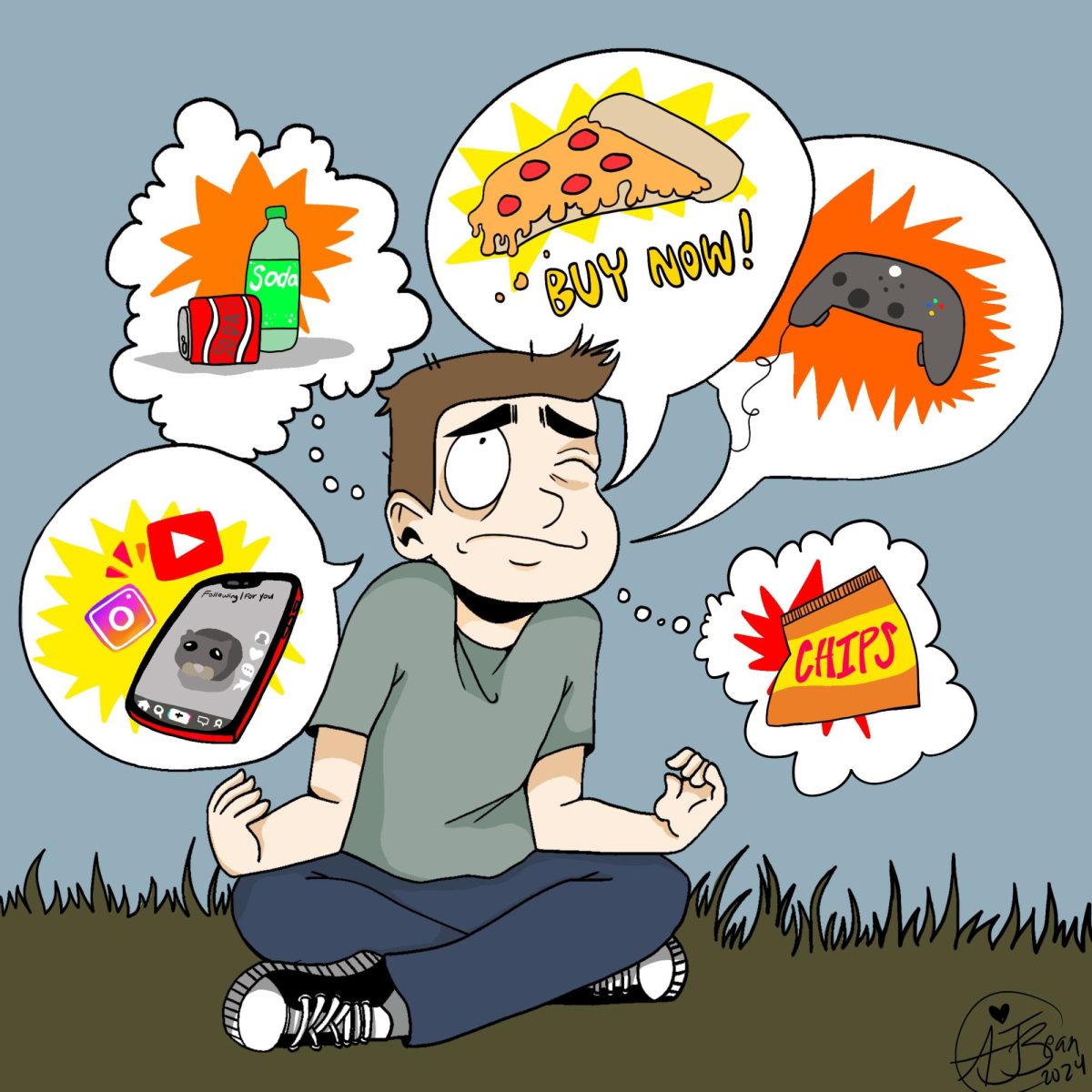Everything is too attractive. This is both the greatest appeal and most disruptive facet of the modern age. With the constant presence of unhealthy stimuli, functioning normally can become difficult.
This phenomenon is most evident in screen time patterns amongst Americans. In the United States, average screen time is just over seven hours. The typical high school student clocks in at a staggering eight hours and a half hours.
Dedicating absurd portions of our day to the cyberverse has become dangerously normalized, in part thanks to technology’s prominence in our lives. Checking messages, accessing social media, playing games, watching videos or utilizing any other app contribute to your screen time total.
It isn’t hard to understand how it’s gotten so out of hand.
Technology is quicker, easier and more consumable than ever before. A phone that fits in your pocket grants the ability to do a million different things. Social media, games, Netflix, YouTube — there are so many instant ways to access dopamine-producing activities that are more entertaining than offline activities.
The digital abyss is rich with gateways into a thousand different worlds, most of which are designed to be more appealing than our own present reality.
To be fair, not all of these hours can be credited to an individual’s addiction or lack of self control. Considering how prominent technology has become throughout most of our lives, it makes sense that screen time would be at an all-time high.
Even schooling has embraced the digital realm. Over the last several years, I’ve noticed a steady shift away from handwritten work. Now, the vast majority of all my assignments and tests are completed and submitted online.
As a result, people are often unaware of the severity of this issue. It’s gotten to the point where most can’t fathom going an entire day without screens. Just think about how often you check your phone or use a computer. Today, you’d be hard-pressed to find someone who doesn’t interact with a screen at least once every hour.
Despite the convenience and appeal of screens, however, a number of issues arise when usage goes too far.
A myriad of studies have revealed that excessive screen time can disrupt sleep quality and schedule. Staying plugged in makes it difficult to fall asleep because of a lack of melatonin, a chemical your body releases in response to darkness. Aside from straining your eyes in a dark setting, bright screen lights reduce melatonin production.
This is often the first domino to fall in a long line of negative effects. Almost everyone is unfortunately familiar with how a rough night of sleep can be brutal — diminished energy and negative mood throughout the day are a couple of the consequences.
Much of screen time usage is often dedicated to scrolling through social media and texting friends. While both aren’t inherently bad, like all things, it needs to be done in moderation. A study conducted by the National Institutes of Health reveals that excessive screen time may be linked to increased symptoms of depression, resorting to screens to cope with stress, decreased productivity and anxiety without a device.
The digital abyss is seductive without a doubt. But life is far too vast to be adequately experienced through a screen, or when several hours a day are dedicated to staring at one. It’s true that screens can show you incredible things. However, a problem arises when it keeps you confined at the same time.
Beyond screens, Americans face a growing problem in food choices. The food industry discovered long ago that tasty foods sell better; today, a large fraction of food engineering is dedicated to finding new ways to please our taste buds, often through copious amounts of sugar or similarly addictive ingredients.
Having sweets around is awesome, don’t get me wrong. I could devour a 12-count box of Häagen-Dazs ice cream in a flash. But products so laden with junk ingredients should never have become mainstays in our diets. Sweets and desserts are the easiest to call out, but the vast majority of the food industry has been swept up in a similar mindset of “sales first, health second.” While setting their own priorities is the right of a private company, Americans have to be mindful of how much and how often they consume junk food.
Whole aisles of grocery stores are dedicated to snacks and chips. In-store bakeries sell pastries tidied up to look as nice as possible. These details are normal in American life, but highlight just how widespread the problem has become.
Even a food as unthreatening as bread wildly differs from other parts of the world. Compared to most European bread, most loaves of bread in the United States are packed with added sugars to increase shelf life and sweetness. An increase in sugar, slight or drastic, across most American foods accumulates to much higher consumption than is healthy.
The prevalence of fast food chains across the country only contributes to the problem at hand. It’s convenient to pull into a drive through, order a Big Mac and some fries and leave within 10 minutes. However, visiting too often results in an invisible tax you end up paying with your health.
The notion of a detox is to cleanse something out of your lifestyle to improve living quality. Various trends have taken social media by storm; influencers preach about drinking superfood smoothies religiously or abandoning all forms of unhealthy dopamine the modern age provides.
Ultimately, you’re cutting back on a number of things that you really enjoy, but it will do you a lot of good.
It doesn’t need to be as aggressive as people make it out to be either. Being mindful of screen time doesn’t necessitate abandoning technology. Cleaning up your diet shouldn’t be done by drinking green veggie concoctions instead of normal meals.
Instead, everyone should try to identify if they’ve got a problem and cut back on what needs to be dialed down. Time dedicated to screens can be refocused to some light exercise. Get some sunshine and funnel effort into a hobby you enjoy. Find time to eat a little better; cooking with friends or family is a great way to have fun and be more conscious of what you’re consuming.
Indulging in excessive screen time or a terrible diet comes at too high of a cost. Detoxing is a great way to increase your happiness and take better control of your life. If people would give detoxing a try, they’d be pleasantly surprised at just how much better they end up feeling.



